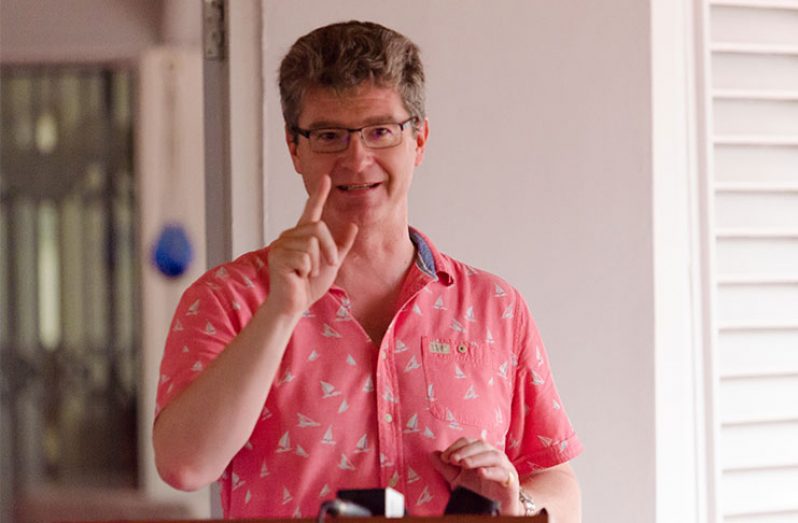SUICIDE is a public health issue and coverage of suicide in the media should be informed by using best practices as some suicide deaths may be newsworthy while others can just influence behaviour negatively.
This was disclosed during a Media workshop on Mental Health hosted on Saturday, at the British High Commissioner’s Residence, in Bel Air Gardens Georgetown.
In attendance was British High Commissioner, Greg Quinn; Deputy High Commissioner Ray Davidson; Psychologist and Counselor Raiza Khan; Director of the Mental Health Unit Dr. Util Richmond-Thomas; Professor Paloma Mohamed, former UG lecturer Vidyaratha Kissoon and Guyana Press Association (GPA) President, Nazima Raghubir and executive of the body.
Discussions surrounded the ethical reporting on mental health and suicide, understanding suicide as a public health issue, understanding the media’s role in informing their audience without sensationalizing suicide.
British High Commissioner, Greg Quinn in his introduction to the workshop noted that suicide should be decriminalized in Guyana since the person who attempts suicide feels devastated in life already.
He noted that such an act is a call for help and not a call for prosecution before the courts.
The British Envoy stated that suicide was removed from the list of criminal offences in England and Wales since 1961 and such actions should follow through for Guyana as well because it eliminates the stigma for surviving family members.

“Suicide here in Guyana needs to be decriminalised. It needs to be taken off the criminal statute. It is no way a criminal offence…It was decriminalised in England and Wales in 1961 with the appropriately named Suicide Act. What that fundamentally means is not only is the stigma removed from surviving family members, but also those who try and fail are no longer prosecuted…Trying to commit suicide is a clear statement of a need for help,” the High Commissioner shared.
Psychologist and Counselor Raiza Khan said media operatives should avoid reporting that death by suicide was preceded by a single event, such as a recent job loss or a single negative event.
She said reporting like this leaves the public with an overly simplistic and misleading understanding of suicide.
“Journalists should follow up suicide stories to see if the family is undergoing counseling,” she said.
Khan explained that media operatives should also consider quoting a suicide prevention expert on causes and treatments while avoiding putting expert opinions in a sensationalistic context.
She said media reports should inform readers about the causes of suicide, its warning signs, and trends in rates and recent treatment advances in order to develop society.
Meanwhile, Director, Mental Health Unit, Dr. Util Richmond-Thomas noted that alcohol and substance abuse are tightly interwoven into all the mental health disorders and maladies that plague the local society.
The Director noted that the integration of mental health into primary health care is an extremely important strategy for the Ministry of Public Health and for the mental health of all Guyanese.
“Self-harm is the strongest indicator of future suicide,” Dr. Richmond-Thomas stated. She further explained that many persons who commit suicide would have had several incidences of self-harm in their past, “It means therefore that if the self-harm was being treated while it was occurring it may not have led to suicide.”
Professor Paloma Mohamed-Martin said journalists should take the opportunity to educate the public about suicide and avoid language which sensationalizes or normalizes suicide, or presents it as a solution to problems.
She explained that the media should avoid prominent placement and undue repetition of stories about suicide and explicit description of the method used in a completed or attempted suicide.
According to the professor, the media should exercise caution in using photographs or video footage and show due consideration for people bereaved by suicide.
She noted that information should be provided about where to seek help while noting that media professionals themselves may be affected by stories about suicide.



.jpg)








